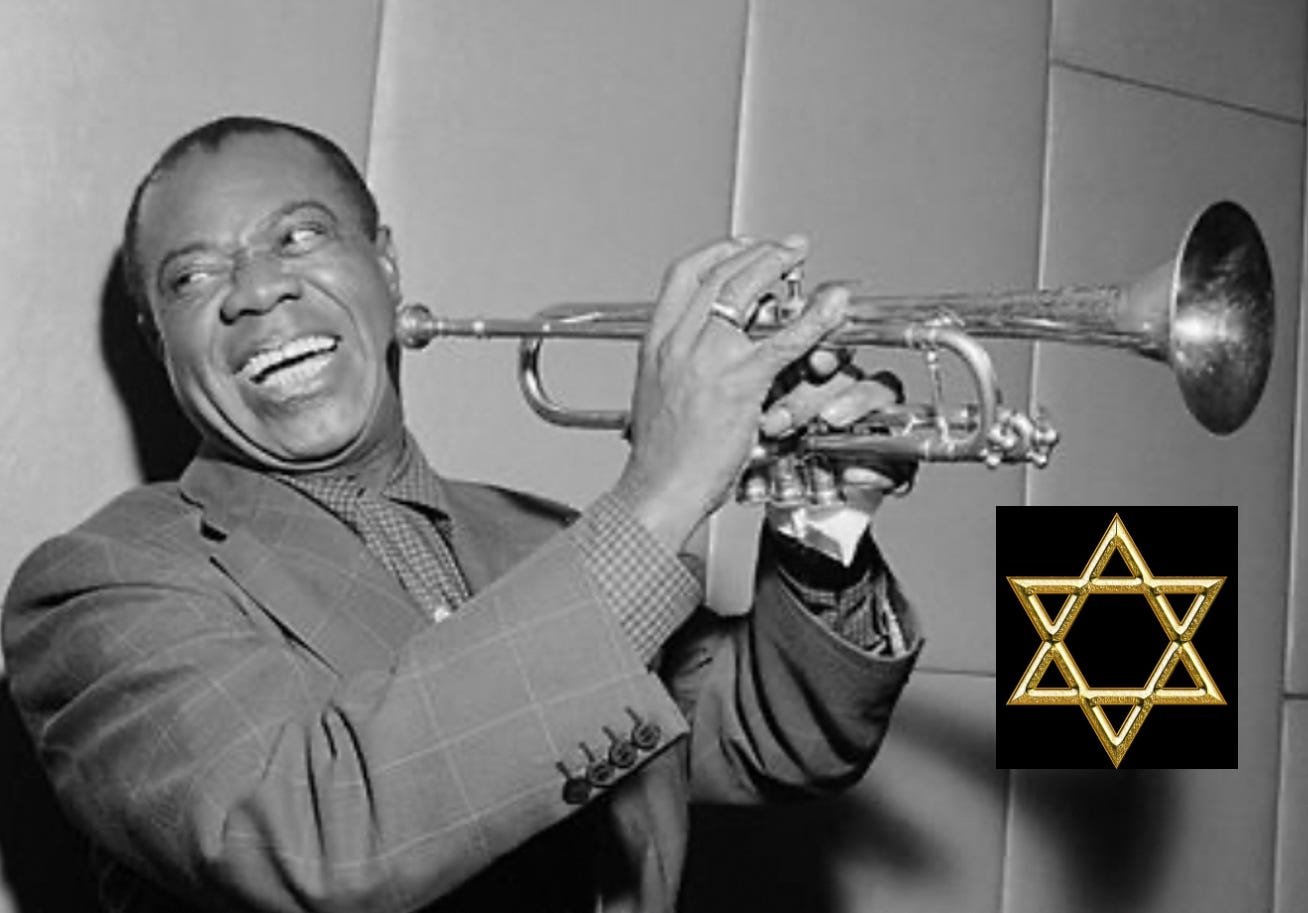The Karnofskys shared their loving home with young Louis Armstrong, future jazz celebrity, and even bought him his first instrument. Armstrong always wore a Star of David in honor of his friends.
There are so many inspiring, beautiful stories about the great heroes of American history which are scarcely ever told. One happens on them accidentally—buried in a thick, out-of-print biography, in small print on a museum sign, casually and fleetingly mentioned in an obscure educational video. America cannot return to greatness in the future if we do not truly understand the greatness of our past. That is why I am writing an article series to tell a few of these little-known but moving “untold stories” of American greatness. Other articles in this series include Abraham Lincoln’s meetings with the former slaves at the contraband camp; the Army Rangers and six heroes of D-Day; Native American Indian soldiers who helped shape America’s history; John Fitzgerald, Irishman, Revolutionary, and friend of George Washington; and how the Union Army helped slave John Washington escape to freedom.
Since today is International Holocaust Remembrance Day, it seems particularly appropriate to remember the Jewish family that helped Louis “Satchmo” Armstrong, one of America’s most famous and influential jazz musicians, get his first instrument—and begin his musical journey.
According to Jewish Journal, Louis Armstrong was born into a part of New Orleans in 1901 that was so violent it was nicknamed “The Battlefield.” Armstrong’s mother was only 16 years’ old and his father ended up abandoning his family. Amidst this abandonment and poverty, young Louis turned to a family of Lithuanian Jews.
“The Karnof[sk]y boys were all fine young men, wonderful dispositions. The whole family had that fine warmth for all their Negro help,” Armstrong reportedly wrote in a memoir. “The Karnofskys would start getting ready for work at five o’clock in the morning and I was right there along with them.”
[Jewish Journal] The Karnofskys were a financially poor but loving family towards Armstrong. They provided a bed, food and shelter, and even included him in their Shabbat dinners. Armstrong had helped the father with his horse-and-wagon hauling business delivering coal. Each day as they passed a particular store, Armstrong pointed to an old cornet in the window, a cornet he couldn’t hope to buy but longed to play. One day, Mr. Karnofsky stopped at the store, walked in and came out with the cornet. He handed it to Armstrong and told him he could work it off. They helped him to purchase his very first instrument.
With the $2 advancement from the Karnofskys to start him off on the $5 cornet, Armstrong penny-pinched from his salary until he paid off the cornet—and he was on his way to becoming a great musician! “Boy was I a Happy Kid,” Armstrong recalled, per STL Jewish Light.
[Jewish Journal] Louis Armstrong proudly spoke Yiddish, loved matzah, had a mezuzah, and always wore a Star of David around his neck, which was given to him for good luck by another Jew who played a significant part in Armstrong’s life, his manager, Joe Glaser. He listened to the Yiddish melodies the mother often sang to her children — later in life, these melodies would find their way into his own music.
STL Jewish Light quotes Louis talking about how the Karnofskys encouraged him to sing, too. “When I reached the age of Eleven I began to realize it was the Jewish family who instilled in me Singing from the heart,” Armstrong stated.
Armstrong wrote a memoir titled Louis Armstrong + the Jewish Family in New Orleans, La., the Year of 1907. He remembered that the Karnofskys, even though they were white, faced discrimination just as he did because they were Jewish. Some white people “felt that they were better than the Jewish race,” Armstrong noted, per Jewish Journal. “I was only seven years old but I could easily see the ungodly treatment that the White Folks were handing the poor Jewish family whom I worked for.”
Unfortunately, racism against black and Jewish Americans was strong then, and continues to this day. It’s encouraging, though, to think that there were white people who fought that discrimination in Hollywood, where Armstrong ended up—one of Armstrong’s best friends was Irish-American star Bing Crosby (see below for a clip of Armstrong and Bing performing together).
As anti-Semitism rears its ugly and violent head again in America, which is supposed to be the land of opportunity and liberty for all men equally, let us remember Louis Armstrong and the Karnofskys. They did not let race and religion divide them, and neither should we. As you listen to Louis Armstrong’s version of the Negro Spiritual “Go Down, Moses,” a song black Americans (including slaves) sang about an episode in the Hebrew Bible, reflect on how America, despite her failures, has always brought people together from every land, background, and ethnicity:



